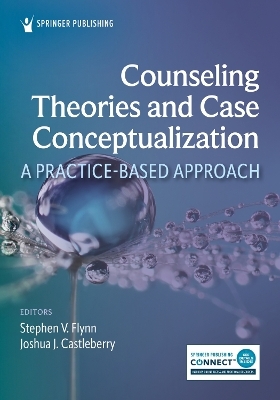
Counseling Theories and Case Conceptualization
Springer Publishing Co Inc (Verlag)
978-0-8261-8291-3 (ISBN)
Nicole R. Hill
Interim Provost and Vice President for Academic Affairs
Professor, Counselor Education
Shippensburg University
Helps future counselors apply key theoretical constructs to real-world scenarios through session transcripts and detailed case conceptualizations
For students enrolled in master’s and advanced doctoral programs, this groundbreaking textbook blends theoretical insight and practical application. Woven throughout is a focus on the multiple levels of diversity, intersectionality, and identity that individuals embody and the skills and interventions necessary to produce positive outcomes. The book is distinguished by the inclusion of Voices from the Field, digital video interviews with 12 expert practitioners of leading theories. These practitioners, representing different contextual backgrounds and intersectional identities, share their perspectives and experiences on how to best use a particular theory to help marginalized communities who have experienced discrimination.
All theory-based chapters provide readers with case conceptualizations, session transcripts, and videos of Voices from the Field. Additionally, all chapters include learning objectives, chapter summaries, and student activities. Within each chapter, students will learn theory-aligned assessment instruments that resonate with clients’ needs and acquire proficiency in an eclectic array of techniques derived from both classic and contemporary counseling theories. The book innovatively applies techniques and skills to pressing issues, such as racism, discrimination, and inequity, through adept application of theory to empower healing and transformation. Instructors will also have access to a full suite of ancillaries, including an Instructor Manual, Test Bank, and chapter PowerPoints. Purchase includes online access via most mobile devices or computers.
Key Features:
Mapped to the Council for the Accreditation of Counseling and Related Educational Programs (CACREP) 2016 and 2024 standards
Examines nuances of 36 counseling theories, new and emerging counseling theories, and describes 24 theoretically congruent assessment instruments
Includes 12 digitally recorded Voices from the Field interviews that showcase first-person accounts from diverse clinicians working with marginalized communities, people of color, LGBTQIA+ clientele, and other underrepresented populations
Contains detailed information about the profession’s unique theoretical history, leaders, legacies, waves of philosophical and political change, and practice-based skills
Incorporates information needed to fully understand how counseling theories make meaning of mental health issues, human development, and client and counselor therapeutic roles
Chapters include an examination of the findings of contemporary theory-based research
Demonstrates the use of theoretical and atheoretical case conceptualization and skills using the same reoccurring case
Provides session transcripts for each theoretical chapter demonstrating in-depth examples of theory-based skills
Stephen V. Flynn, PhD, LPC, LMFT-S, NCC, ACS, is a professor of counselor education, a research fellow, the founding director of the Marriage and Family Therapy program, and the Play Therapy program coordinator at Plymouth State University in Plymouth, New Hampshire. Dr. Flynn earned his MA degree from Rowan University and his PhD from the University of Northern Colorado. He teaches counseling; couple, marriage, and family; child and adolescent; and research and writing courses for the Counselor Education, Marriage and Family Therapy, and Educational Leadership graduate programs at Plymouth State University. He is a licensed professional counselor (Colorado), a licensed marriage and family therapist (LMFT; Colorado, New Hampshire), a national certified counselor, an approved clinical supervisor, an American Association for Marriage and Family Therapy (AAMFT) clinical fellow, and an AAMFT approved supervisor. Joshua J. Castleberry, PhD, NCC, is an assistant professor of counselor education at Kent State University in Kent, Ohio. He earned his MS, EdS, and PhD degrees from Georgia State University. Dr. Castleberry teaches courses on counseling theories, case conceptualization, foundations of addiction, and psychopathology for graduate programs in Counselor Education and Supervision. He is also a regional epidemiologist for the Ohio Substance Abuse Monitoring (OSAM) team under the Ohio Department of Mental Health and Addiction Services (OMHAS), where he tracks drug trends in Southeastern Ohio. With a primary clinical focus on addiction, trauma, and crisis counseling, Dr. Castleberry has extensive experience as an addiction counselor, working with chemically dependent clients and advocating for counseling services to at-risk homeless populations.
List of Contributors
Foreword
Preface
Acknowledgements
SECTION I. INTRODUCTION AND SOCIAL JUSTICE ORIENTED THEORIES
Chapter 1. Introduction to Theory and Case Conceptualization
Stephen V. Flynn and Joshua Castleberry
Chapter 2. Multicultural Counseling Theory
Sherritta Hughes
Chapter 3. Feminist Approaches
Amanda C. La Guardia
SECTION II. TRADITIONAL AND RELATIONAL PSYCHOANALYTIC THEORIES
Chapter 4. Traditional Psychoanalytic Approaches
Elyssa B. Smith, Andrea McGrath, Joshua Mangin, and Nicole Altenberg
Chapter 5. Relational Approaches to Psychoanalytic Treatment
Sherrie Bruner and Julianna Williams
SECTION III. PERSON-CENTERED, EXPERIENTIAL, AND EXISTENTIAL THEORIES
Chapter 6. Person-Centered Counseling and Related Experiential Approaches
Elizabeth K. Norris, Tyler Wilkinson, and Jeff D. Cook
Chapter 7. Existential-Humanistic Approaches
Joel Givens, Phillip L. Waalkes, and Paul H. Smith
SECTION IV. BEHAVIORAL AND COGNITIVE THEORIES
Chapter 8. Behavioral Approaches
Lynne Guillot Miller
Chapter 9. Cognitive Approaches
Dodie Limberg, Alexander M. Fields, Donya Wallace, Rawle D. Sookwah, and Sabrina M. Johnson
SECTION V. SYSTEMIC AND POSTMODERN THEORIES
Chapter 10. Systemic Approaches
Tiffany Nielson and Timothy J. Hakenwerth
Chapter 11. Postmodern Approaches
Michelle Hinkle and Caroline Perjessy
SECTION VI. INTERGRATIVE AND BRIEF COUNSELING THEORIES
Chapter 12. Integrative Approaches
Bradley McKibben and Seneka R. Gainer
Chapter 13: Brief Counseling Approaches
Derek X. Seward and Brittany A. Williams
Index
| Erscheinungsdatum | 18.01.2024 |
|---|---|
| Zusatzinfo | 15 Illustrations |
| Verlagsort | New York |
| Sprache | englisch |
| Maße | 178 x 254 mm |
| Gewicht | 748 g |
| Themenwelt | Geisteswissenschaften ► Psychologie ► Allgemeine Psychologie |
| Medizin / Pharmazie ► Medizinische Fachgebiete ► Psychiatrie / Psychotherapie | |
| Medizin / Pharmazie ► Physiotherapie / Ergotherapie ► Rehabilitation | |
| ISBN-10 | 0-8261-8291-7 / 0826182917 |
| ISBN-13 | 978-0-8261-8291-3 / 9780826182913 |
| Zustand | Neuware |
| Informationen gemäß Produktsicherheitsverordnung (GPSR) | |
| Haben Sie eine Frage zum Produkt? |
aus dem Bereich


